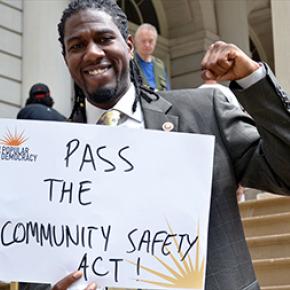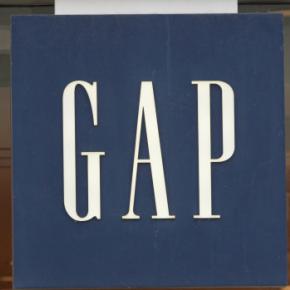City Council Votes to Create Municipal ID Cards
NY Daily News - June 26, 2014, by Erin Durkin - The City Council voted to create municipal ID cards Thursday, giving the city’s half a million undocumented immigrants a way to prove their identity...
NY Daily News - June 26, 2014, by Erin Durkin - The City Council voted to create municipal ID cards Thursday, giving the city’s half a million undocumented immigrants a way to prove their identity.
The 43 to 3 vote will launch the largest local ID program in the nation - also allowing transgender, homeless, and elderly people who sometimes struggle to get driver’s licenses to secure an ID. Two members abstained from voting.
“Plain and simple, this is an ID for everyone,” said Speaker Melissa Mark-Viverito. “We don’t accept that some people will simply be left out because of their immigration status, how they identify their gender, or whether they may be homeless.”
The cards are expected to start being issued in late 2014 or early 2015, and will cost $8.4 million to launch over the next year and $5.6 million a year to keep running after that.
To get an ID, an applicant will have to prove their identity with documents like a birth certificate or passport from any country, and prove they live in New York through papers like utility bills and pay stubs.
The cards will be accepted by city agencies from residents seeking services, let parents enter school buildings, and give people an ID to present to police if they are stopped, which sometimes spells the difference between spending a night in jail and being released.
The city is aiming to get banks and landlords to accept the card from people trying to open bank accounts or sign leases, but private institutions will not be legally required to accept it.
Critics say the bill does not make requirements for the ID secure enough to ensure it won’t be abused.
“There are legitimate security concerns that have not been adequately addressed,” said Minority Leader Vincent Ignizio (R-Staten Island), who voted no. “There are ways we can tighten it up, and there are ways we should tighten it up.”
He added the city should “want to encourage people to come here legally.”
Others feared the cards would become a scarlet letter of sorts identifying people as undocumented.
Councilman Alan Maisel (D-Brooklyn), who abstained, said he fears the cards could be used by a future anti-immigrant federal administration to mount a crackdown on the undocumented. “We are basically presenting and preparing a list of undocumented workers,” he said. “I don’t think people should be placing themselves in the position where they can be identified when they are not here legally.”
Officials say they’ll try to combat that stigma by putting benefits such as museum discounts on the card to encourage a broad group to sign up, but details of that plan have not been worked out.
Cards will include a holder’s name, picture, address, and date of birth. Applicants will get to choose whether to have the gender they self-identify with listed on the card, answering a demand from transgender advocates who say they will be able to have an ID that matches their gender identity for the first time.
Other cities including Los Angeles, San Francisco, and New Haven currently have municipal IDs.
Councilman Mark Weprin (D-Queens) advised those with concerns about the program to “relax” and predicted the card would have broad appeal.
“We live in the coolest city in the world, and now we have a membership card,” he said. “People are going to want to be part of that club.”
Update: Mayor de Blasio, a strong backer of municipal IDs, said in a statement:
“Every New Yorker deserves an official identification that allows them to prove who they are and access core services. I thank Speaker Melissa Mark-Viverito, Councilmembers Daniel Dromm and Carlos Menchaca, and the entire City Council for quickly enacting this critical legislation, and all of the advocates who have worked so hard to make community voices heard. The municipal ID is more than just a card – it provides New Yorkers who are currently living in the shadows with dignity and peace of mind. My administration is fully ready to develop this plan and to swiftly implement a secure and accessible Municipal ID Card program.”
Source
New York State Exposed Education: We're Watching What Charter Schools do with your hard earned money
New York State Exposed Education: We're Watching What Charter Schools do with your hard earned money
NBC News - February 25, 2015, by Berkeley Brean - You know that hard earned money you pay the state and your local school district in taxes? Every year more of it goes to charter schools. $1.5...
NBC News - February 25, 2015, by Berkeley Brean - You know that hard earned money you pay the state and your local school district in taxes? Every year more of it goes to charter schools. $1.5 billion this year alone. So who's keeping an eye on that money to make sure it's not getting wasted? That's what we're digging into in our exclusive New York State Exposed Education report. The report outlining fraud and mismanagement by charter schools in New York is titled "Risking Public Money: New York Charter School Fraud." Click here to read the report
What would the reaction be if the superintendent or principal in your school district signed deals with their friends and contacts? We're going to lay out the facts and circumstances and you decide whether the charter school did something wrong or was being efficient.
Eugenio Maria de Hostos parent Jeremaine Curry says, "We want to give our kids the best foundation."
Jeremaine Curry made a choice. He wanted his son Jayden to be in a school he trusted, so he chose Eugenio Maria de Hostos -- the oldest charter school in the city. He says, "It gives our kids the best competitive advantage."
Eugenio is listed in the report that analyzed audits by the state comptroller's office. At Eugenio, the audit showed the school gave contracts to organizations either run by board members or friends of board members. For example, their first building? Owned by the Ibero Action League, the sponsor of the school and the rent was "set a bit higher."
The school pays $200,000 for Phys Ed at the downtown YMCA run by board member George Romell, $57,000 for music instruction from the Hochstein School of Music where board member Margaret Quackenbush teaches and $100,000 contract for cleaning services where the company's manager is a board member's brother.
Berkeley Brean: "Everybody who got hired or got that job either had a connection to the board or was a friend of yours."
Julio Vasquez, Chair of Eugenio Maria de Hostos Charter School: "Ah, not really. Here's what happened."
Vasquez says the non-profits they contract with were partners of the charter from day one.
Brean: "So you don't think you could have saved public money at all by putting out bids?"
Vasquez: "Not at all. Who in the community would...?”
Brean: "How would you know unless you did it?"
Vasquez: "I would not know."
The report says because of a general lack of oversight of charter schools, the state could lose $54 million in possible charter school fraud and mismanagement in one year. Regular district schools get audited at least once every five years. Charter schools can be audited, but only at the state comptroller's discretion. We tracked down Kyle Serrette -- the author of the report and we pressed him on the criticism of Eugenio.
Brean: "Is what they did all that bad?"
Kyle Serrette: "When they rented a facility without figuring out the fair market value was then that potentially wasted money."
Brean: "I mean, to me, it sounds like they were using the efficiencies that were at their fingertips."
Serrette: "They may have been doing the best they know how to do."
Serrette continues, "If you're going to enter into an agreement, you should see if there's a better deal elsewhere."
"Absolutely, I mean, that we didn't follow the procurement process in certain instances? I admit that and going forward, we will," says Vasquez. "But I have to also say that there are times when you have an emergency that you have to act and get it done. That's what we're all about."
Now, Eugenio Maria de Hostos has the second highest test scores of the 11 charters in Monroe County. Its charter just got re-approved by the state, so the state thinks it's doing a good job for children.
Source
Arizona special election 2018: ALS patient and activist Ady Barkan stumps for Democrat Hiral Tipirneni

Arizona special election 2018: ALS patient and activist Ady Barkan stumps for Democrat Hiral Tipirneni
Be a Hero is an offshoot of the Center for Popular Democracy’s CPD Action group (Barkan previously worked for the center) and will concentrate on boosting Democratic candidates focused on...
Be a Hero is an offshoot of the Center for Popular Democracy’s CPD Action group (Barkan previously worked for the center) and will concentrate on boosting Democratic candidates focused on protecting health care and entitlement programs like Medicare, Medicaid, and Obamacare, as well as ousting Republican incumbents who voted for the GOP tax plan or have voiced support for cutting entitlements.
Read the full article here.
I don’t like the GOP tax bill, but now my life depends on beating it

I don’t like the GOP tax bill, but now my life depends on beating it
My path as an activist had been fairly conventional. After law school, I represented low-wage Latino workers in Queens who had been victims of wage theft, and I helped write New York City’s...
My path as an activist had been fairly conventional. After law school, I represented low-wage Latino workers in Queens who had been victims of wage theft, and I helped write New York City’s groundbreaking paid sick days law. Later, I created a campaign called Fed Up, urging the Federal Reserve to use its economic tools to focus on raising wages and creating jobs, not just minimizing inflation. I didn’t think of myself as a direct beneficiary of these policies: I was an upper-middle class white man with elite degrees, a bright future and financial security. I could focus on empowering others.
Read the full article here.
Community Safety Act Passes; NYC Council Overrides Bloomberg Vetoes On NYPD Oversight Bills
The Huffington Post - August 22, 2013 - The New York City Council voted Thursday to override Mayor Michael Bloomberg's vetoes of two bills aimed at reining in the New York City Police Department'...
The Huffington Post - August 22, 2013 - The New York City Council voted Thursday to override Mayor Michael Bloomberg's vetoes of two bills aimed at reining in the New York City Police Department's controversial use of stop and frisk.
The council passed the Community Safety Act earlier this summer. It sets up the office of the inspector general-- which will act as a watchdog over the NYPD--and makes it easier for New Yorkers to sue if they've been racially profiled by police.
Mayor Michael Bloomberg vetoed both provisions, and vowed to use his own fortune to convince key council members not to override him.
But on Thursday, after impassioned speeches from many council members--including a tearful speech from bill co-sponsor Jumaane Williams--the council voted to override both vetoes.
The Community Safety Act will be enacted over the next few months:
Earlier this month, a federal judge ruled the NYPD's use of stop and frisk was unconstitutional, and appointed a federal monitor to oversee the department.
In 2012, the NYPD stopped 533,042 people, 87 percent of who were either black or Latino.
Source
Explosion of Gig Economy Means There’s an App for Juggling Jobs
One of the reasons Mustafa Muhammed finally broke down and bought a smartphone was because he needed to find a job.
The 57-year-old cook was tired of using a...
One of the reasons Mustafa Muhammed finally broke down and bought a smartphone was because he needed to find a job.
The 57-year-old cook was tired of using a library computer to look for work and watching friends get a jump on leads via alerts on their phones. After picking up his first phone about two years ago, he downloaded a mobile app called Snagajob. This summer he landed a gig at a new IHOP opening in Harlem after seeing it pop up in his inbox.
“This is job No. 2,” says Muhammed, who also works in the dining hall at Fordham University. “I wanted to pick up a little something extra for the summer. I don’t like to be lazy.”
Snagajob is one of a slew of apps that have sprung up in recent years to serve the so-called gig economy. This year alone human-resources startups have attracted $1.2 billion in venture capital, with much of the funding going to companies designed to profit from the fluid nature of temporary or contract work, according to research firm CB Insights. In an election year dominated by concerns over economic inequality, Hillary Clinton and Donald Trump are pledging to generate more full-time jobs. But Silicon Valley is betting the gig economy is here to stay.
“Two or three years ago, it was pretty rare to have more than one job” says Snagajob.com Inc. Chief Executive Officer Peter Harrison. “Now it’s really very common. What we are really building our business on is the blurring of the line between snagging a job and snagging a shift.”
Founded in 2000 as an online job board focused on “lightly skilled” hourly work, Snagajob says it has nearly doubled revenue derived from employers in the past three years. It claims 10 million unique monthly users and about 425 employees. In June, the Virginia company unveiled a mobile messaging app that lets employers assign shifts and lets workers trade them.
Snagajob charges employers for the number of clicks, applicants, interviews and hires it lines up. It also sells annual subscriptions for use of its hiring software. Harrison, 53, declines to specify revenue but says Snagajob is breaking even. In February, the startup raised $100 million to develop new features and fund acquisitions. The same month, Snagajob announced a partnership with LinkedIn, which has typically represented salaried professionals, to share research and data on hourly workers.
Similar apps are taking off in Europe, as well. Spain, with a large service sector and 20 percent unemployment, has become a testing ground for startups bringing the simplicity of swipes, geolocation and people-matching algorithms to hourly job recruitment. Three of them -- Job Today, Jobandtalent and CornerJob -- have raised some $87 million combined this year.
Job Today helps restaurants and retail mom-and-pops find and interview waiters, sales associates and drivers. Employers can post as many jobs as they like and have 24 hours to shortlist candidates, after which they use a chat feature to discuss the job and schedule face-to-face interviews. Posting a position on Job Today is gratis for now. Eventually, it plans to sell subscriptions that will let employers browse candidates and post jobs on an unlimited basis. The startup says it has about 100,000 business customers and has processed 15 million job applications since its founding a year ago.
Workforce trends are moving in favor of these apps as more people prefer to choose their own hours. In the U.S., even if they would rather work full-time, government policy has increased the incentive for companies to hire temps and contract workers, Snagajob’s Harrison says. To avoid providing health care as mandated by Obamacare, many businesses deliberately ensure workers toil less than 30 hours a week. They may also prefer temps to avoid paying overtime now that the Obama administration has expanded eligibility to millions more Americans.
According to research from Harvard and Princeton universities, “alternative work arrangements” -- including temp work, on-call work, contractors, and freelancers -- accounted for all the net employment growth in the U.S. from 2005 to 2015. That trend is widely expected to continue.
“These new labor platforms are helping people deal with the volatility of their income and the volatility of work,” says Louis Hyman, a professor of economic history at Cornell University’s ILR School and author of a forthcoming book on the rise of temp work in the U.S. “The tech reflects social reality.” Snagajob’s Harrison says companies are “essentially sharing workers” much the way consumers are sharing car rides and vacation rentals.
A handful of large deals, crowned by Microsoft’s $26 billion acquisition of LinkedIn, has fueled investor enthusiasm. In June, Monster Worldwide Inc. bought San Francisco-based Jobr, which applies Tinder-like matching algorithms to job hunters and employers. Last month, Tokyo’s Recruit Holdings, which controls top-ranked job search site Indeed Inc., bought Simply Hired, which operates a global network of job search engines.
Of course, not everyone is as enamored of the gig economy as the tech industry. “This glorification of flexibility is not in line with the reality of what most working people really want,” says Carrie Gleason, who runs the Fair Workweek Initiative, a network of activist groups that has pushed for laws to support predictable scheduling and guaranteed hours in low-wage industries. Shift-swapping is “a survival tool,” she says. “It is not the ideal.”
By Polly Mosendz
Source
New York dedicates millions of dollars to help immigrants fight deportations

New York dedicates millions of dollars to help immigrants fight deportations
New York will soon offer free legal services for poor immigrants facing deportations, thanks to a new budget provision announced this week by Gov. Andrew Cuomo.
The state’s 2017-2018 budget...
New York will soon offer free legal services for poor immigrants facing deportations, thanks to a new budget provision announced this week by Gov. Andrew Cuomo.
The state’s 2017-2018 budget sets aside $10 million for expanding immigrant legal defense services, $4 million of which will go to the Vera Institute of Justice’s New York Immigrant Family Unity Project — a coalition of groups that seek to ensure that all undocumented immigrants have public defenders...
Read full article here.
Ana Maria Archila On Confronting Jeff Flake
NPR's Lulu Garcia-Navarro talks with Ana Maria Archila of the Center for Popular Democracy about her widely-publicized confrontation with Sen. Jeff Flake of Arizona in a Capitol Hill elevator....
NPR's Lulu Garcia-Navarro talks with Ana Maria Archila of the Center for Popular Democracy about her widely-publicized confrontation with Sen. Jeff Flake of Arizona in a Capitol Hill elevator.
Listen to the interview here.
The resistance is making one last all-out push to kill the GOP health bill

The resistance is making one last all-out push to kill the GOP health bill
More than 300 health care activists, disability rights advocates, and organizers gathered on second floor of the Dirksen Senate Office Building on Monday morning to oppose Senate Republicans’...
More than 300 health care activists, disability rights advocates, and organizers gathered on second floor of the Dirksen Senate Office Building on Monday morning to oppose Senate Republicans’ Graham-Cassidy health care bill.
The bill would sharply reduce spending for Medicaid by billions of dollars by tying it to medical inflation, blow up Obamacare’s marketplaces, and open the door for states to curtail protections for patients with preexisting conditions.
Read the full article here.
Companies End On-Call Scheduling After NY Attorney General’s Letter
Gap Inc. is the latest retailer to end its practice of requiring workers to remain on-call for short-notice shifts following an inquiry from New York’s attorney general.
A spokeswoman for...
Gap Inc. is the latest retailer to end its practice of requiring workers to remain on-call for short-notice shifts following an inquiry from New York’s attorney general.
A spokeswoman for the San Francisco-based retailer says the decision also applies to Gap’s other brands, including Banana Republic, Old Navy and Athleta and was part of an effort to “improve scheduling stability and flexibility” for workers.
Spokeswoman Laura Wilkinson says the change will apply “across our global organization” and that the company is working to establish scheduling systems giving store employees at least 10 to 14 days’ notice.
Attorney General Eric Schneiderman’s office sent letters to Gap and 12 other retailers earlier this year questioning them about on-call scheduling, which required hourly workers to stay on-call for shifts set the night before or the same day, giving them little time to arrange for child care or work other jobs.
“Workers deserve stable and reliable work schedules, and I commend Gap for taking an important step to make their employees’ schedules fairer and more predictable,” said Schneiderman, a Democrat.
Abercrombie & Fitch and Victoria’s Secret also ended the practice this summer.
Carrie Gleason, director of the Fair Workweek Initiative at the Center for Popular Democracy, said in a statement that Gap’s decision reflects not only Schneiderman’s concerns but also a new ordinance in San Francisco requiring chain retailers to set schedules in advance. Similar proposals are pending before other city governments.
“Working people in hourly jobs are starting to speak out about the impact that employers’ scheduling practices has on their lives,” Gleason said in a statement.
Source: CBS DC











2 months ago
2 months ago